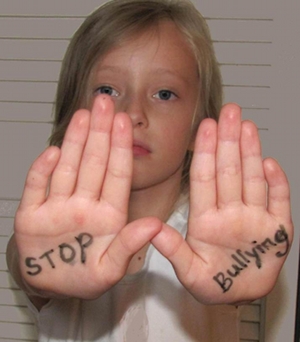NIMBioS Study Finds Bullies Squelched When Bystanders Intervene
August 13, 2012

With new national anti-bullying ads urging parents to teach their kids to speak up if they witness bullying, one researcher has found that in humans' evolutionary past at least, helping the victim of a bully hastened our species' movement toward a more egalitarian society.
Humans have evolved a genetically-controlled drive to help weaker individuals fight back against a bully. The drive to help the weaker group members led to a dramatic reduction in group inequality and eventually enabled humans to develop widespread cooperation, empathy, compassion and egalitarian moral values, according to the paper which appeared August 13 in the online edition of the Proceedings of the National Academy of Sciences.
The findings appear to support prior research showing that more egalitarian societies, such as in Scandinavian countries, appear to keep bullying in check. In one of the earliest cross-national studies on bullying in schools by professor Dan Olweus, who pioneered anti-bullying programs worldwide beginning in the early 1980s, the behavior was found to occur at lower rates in Denmark, Sweden and Norway. These findings are supported by additional, more recent studies by the National Institutes of Health and the World Health Organization.
Using a mathematical model, the paper's author Sergey Gavrilets showed that differences in fighting abilities cause hierarchies to emerge where stronger individuals take away resources from weaker individuals. However, when individuals realize greater benefits can occur if they prevent the transfer of resources from weaker individuals, a particular, genetically controlled psychology evolves that causes individuals to intervene on behalf of the victim. While intervening carries some risk, the helping pays off in the long term, ensuring that everyone's resources remain equal, Gavrilets finds.
"Based on the results, helping the victim then is the evolutionary 'right' thing to do, not only from a victim's point of view or a societal point of view but also the helper's point of view. As such, I'd speculate that this is also a psychologically rewarding thing to do in spite of the risks potentially involved," said Gavrilets, who is the Associate Director for Scientific Activities at the National Institute for Mathematical and Biological Synthesis and a professor at the University of Tennessee-Knoxville.
With almost one in five U.S. students reporting having been bullied sometimes or more often and a recent spate of teen suicides linked to bullying, the Obama administration has vowed to make anti-bullying a national priority and has endorsed the national ad campaign.
Citation: Gavrilets S. 2012. On the evolutionary origins of the egalitarian syndrome. Proceedings of the National Academy of Sciences. [Online]
Media Coverage Highlights
Science Illustrated:
Are we hardwired to cooperate or bully?
Los Angeles Times:
Evolution stands up to bullies
Health Magazine:
Fight the power: Standing up to bullies benefits us all
Examiner:
Bullying is genetically evolutionary 'right thing to do'
Discover:
Against the Übermensch
Knoxville News-Sentinel:
Science and bullying: Why we are programmed to help others
French Tribune:
Standing up against bullying is in the genes
The Korean Herald:
Study: Fighting bullies pushed evolution
#
The National Institute for Mathematical and Biological Synthesis (NIMBioS) brings together researchers from around the world to collaborate across disciplinary boundaries to investigate solutions to basic and applied problems in the life sciences. NIMBioS is supported by the National Science Foundation, the U.S. Department of Homeland Security, and the U.S. Department of Agriculture with additional support from The University of Tennessee, Knoxville.
NIMBioS
1122 Volunteer Blvd., Suite 106
University of Tennessee
Knoxville,
TN 37996-3410
PH: (865) 974-9334
FAX: (865) 974-9461
Contact NIMBioS


